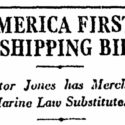The first problem we find with understanding the Jones Act is that we can get two different laws confused.
- The Jones-Shafroth Act in 1917 made Puerto Ricans U.S. citizens.
- The section of the Merchant Marine Act of 1920 sponsored by and named after Senator Wesley R. Jones set rules for trade between U.S. ports.
When we talk about the Jones Act now, we mean the second set of rules. These rules apply to goods going from one U.S. port, such as the Port of San Juan, to another U.S. port, such as Port Everglades.
Any ship going between two U.S. ports must meet four rules:
- U.S. owned, with companies owning all ships having at least 75% ownership by U.S. citizens
- Crewed by 75% U.S. citizens; only 25% of crew members can be non-citizens
- Built in the United States (not required for distant territories like Guam)
- Registered in the United States and flying under a U.S. flag
These rules apply only to ships carrying freight from one U.S. city to another. Foreign ships can bring goods from other countries to a U.S. port and carry goods from a U.S. port to another country. The Jones Act applies only to “cabotage” — a term referring to carrying goods down a coastline to multiple U.S. ports.
Reasons for the Jones Act
While some observers, such as John McCain, consider the Jones Act a protectionist law that limits trade, the goal of the Jones Act is more connected with defense than with trade.
The United States needs to be able to build ships and to crew them up in times of war. The U.S. shipping industry might not be able to stay strong between wars if it had to compete with other nations on a level playing field.
Cabotage laws like the Jones Act are meant to encourage the U.S. to have a strong shipbuilding industry and to have skilled sailors available to the Navy on short notice. Without laws of this kind, the United States could find that shipbuilders were needed but few people had the required skills.
For example, the United States cut back on manufacturing for several decades. Now, with the average machinist in his 50s and nearing retirement, U.S. manufacturers expect to have more than two million jobs they can’t fill within the next decade.
This kind of skills gap can have economic consequences during peacetime. Senator Jones felt that a lack of qualified seamen and shipbuilders could be very dangerous during wartime.
It was also believed that shipping lines for ordinary transportation would be more likely to stay open with the support of the Jones Act.
Effects of the Jones Act
Here’s where the controversy arises. Some observers believe that the Jones Act increases costs of goods. Puerto Rico has imported as much as 85% of food in recent years. Much of that food comes from the United States. If it actually costs much more to ship goods under the Jones Act, the costs of goods could be higher in Puerto Rico than they should be.
A 2018 report found that this is not the case. There are quite a few reasons:
- Shipping costs are just a tiny fraction of the cost of goods, not enough to drive higher costs.
- Retail prices of goods are not significantly higher in Puerto Rico than the same items in the states.
- More than half of the ships bringing cargo into Puerto Rico are foreign vessels which are not affected by the Jones Act.
A report from the Government Accountability Office drew the same conclusions a few years ago. They also noted that the Jones Act allowed U.S. ships to benefit from backhauls, regular freight runs, and other cost-cutting measures that might not be available without the Jones Act.
While the GAO report is very detailed, it also lists many areas in which exact data is not available. Freight costs are often negotiated and threfore secret. Some shippers reported that they set their costs based on the local competition, not on the shipping costs. “The prices of goods sold in Puerto Rico are determined by a host of supply and demand factors,” the GAO reported, “and therefore, the impact of any costs to ship between the United States and Puerto Rico on the average prices of goods in Puerto Rico is difficult, if not impossible, to determine with precision.”
The bottom line
Those who claim that the Jones Act causes higher prices are generally relying on a feeling that it should cause higher prices, or a sense that prices seem high. Since prices are typically about the same for U.S.-made goods in Puerto Rico and in Florida, there is also a group claiming that prices would have been lower without the Jones Act. This is an alternate-history position that is impossible to test.
It is clear that foreign ships can operate more cheaply than American ones. It’s not clear that this causes higher prices for consumer goods. In fact, the GAO report pointed out that buyers in Puerto Rico may choose foreign goods rather than U.S. products when U.S. products are too costly. Without the Jones Act, they decided, prices probably wouldn’t be very different, but shipping from the mainland to Puerto Rico might be less reliable.








No responses yet